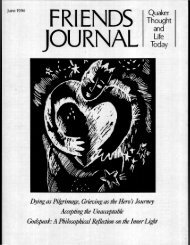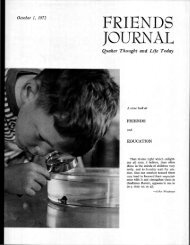Friends Journal
Friends Journal
Friends Journal
Create successful ePaper yourself
Turn your PDF publications into a flip-book with our unique Google optimized e-Paper software.
T he<br />
The Lie of Politics<br />
by David Oates<br />
political season is over at last.<br />
The ballots have been counted,<br />
the predictions silenced. And, at<br />
least in the circles I travel-teachers, fellow<br />
Quakers, the various left-leaning<br />
people encountered on Los Angeles's<br />
Westside-an emotion approaching despair<br />
is rampant.<br />
A phone call pulled me from the television<br />
on election night. " I'm so<br />
depressed," said the friend. She laughed<br />
a little, but she meant it. Her voice was<br />
flat and had a where-do-we-go-fromhere<br />
quality that you associate with<br />
people in newscasts who stare at their<br />
burned houses or wrecked farms.<br />
In meeting on Sunday, others spoke<br />
of their alienation from most Americans,<br />
their sense that the nation's values<br />
had become so distorted that we no<br />
longer held anything in common with<br />
them. People struggled to find sense in<br />
this overwhelming catastrophe. They<br />
did not find much.<br />
It concerns me. In fact, the reaction<br />
to Ronald Reagan's reelection concerns<br />
me far more than the election itself. The<br />
depression that afflicts us shows how far<br />
we have all begun to believe the lie of<br />
politics.<br />
It is a common observation that politics<br />
is theater. We joke about the makeup,<br />
the false promises and speeches, the<br />
shallow television performances, but we<br />
often miss the deeper import of the observation.<br />
Politics, like theater, is fiction. The<br />
political theater is set up as a ritual combat<br />
in which good guys may triumph<br />
over bad guys, to the general satisfaction<br />
of the audience. This may be a good<br />
way to unite and express a people's will,<br />
but it is, nonetheless, a mostly fictional<br />
reality.<br />
But aren't the stakes real? Of course<br />
A member of Santa Monica (Calif.) Meeting,<br />
David Oates is a writer, carpenter, poet, and<br />
teacher who lives in Venice, Calif. His article is<br />
reprinted with permission from the Other Side<br />
magazine, 300 W. Apsley St., Philadelphia, PA<br />
19144. Copyright © 1985.<br />
10<br />
they are. The presidency is real enough,<br />
and so were the differences between<br />
Reagan and Mondale. The actual lives<br />
of millions of people will almost certainly<br />
be affected for good or ill.<br />
But the theatrical production by<br />
which we choose our leaders only dimly<br />
reflects these realities. It doesn't take<br />
much thought to see that the real world<br />
can seldom be reduced to a single eitheror<br />
choice. And it takes only a little sophistication<br />
to realize that the choices in<br />
U.S. politics are always between two<br />
fairly centrist positions.<br />
On the global political spectrum,<br />
Democrats and Republicans are very<br />
close together, huddled around a consensus<br />
that ignores the issues facing the<br />
rest of the world: mass starvation, economic<br />
development and indebtedness,<br />
cultural invasion, ecological devastation,<br />
nuclear survival. Whichever side<br />
wins, it will make only a fine-tuned<br />
change in U.S. actions.<br />
From this perspective, our electoral<br />
choice looks, if not unimportant, at least<br />
a lot less than cosmic.<br />
Nevertheless the political fiction lures






